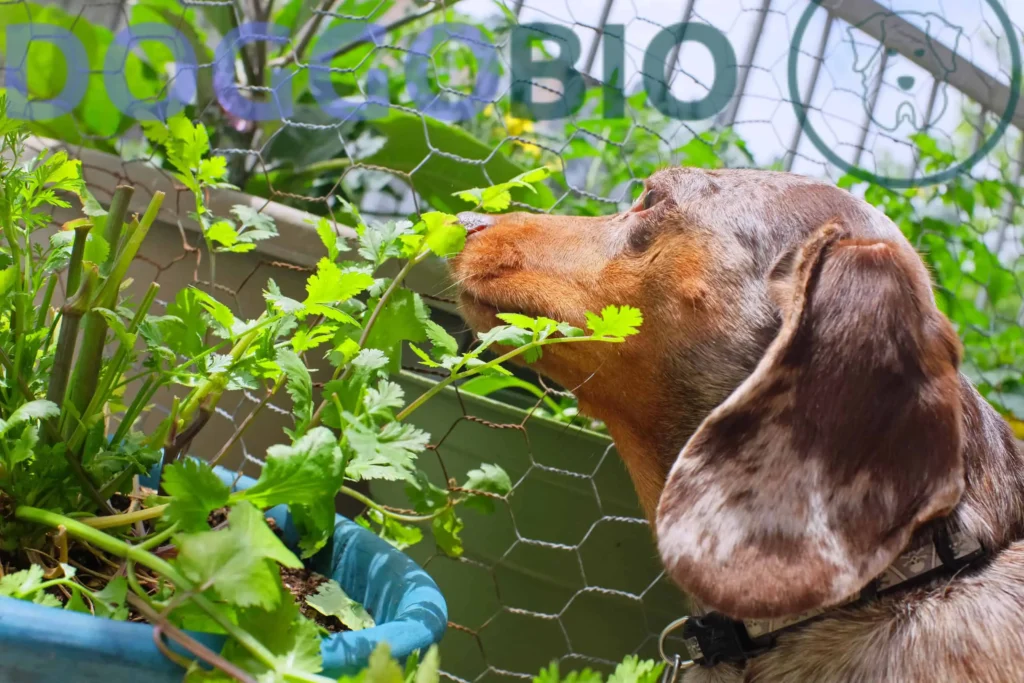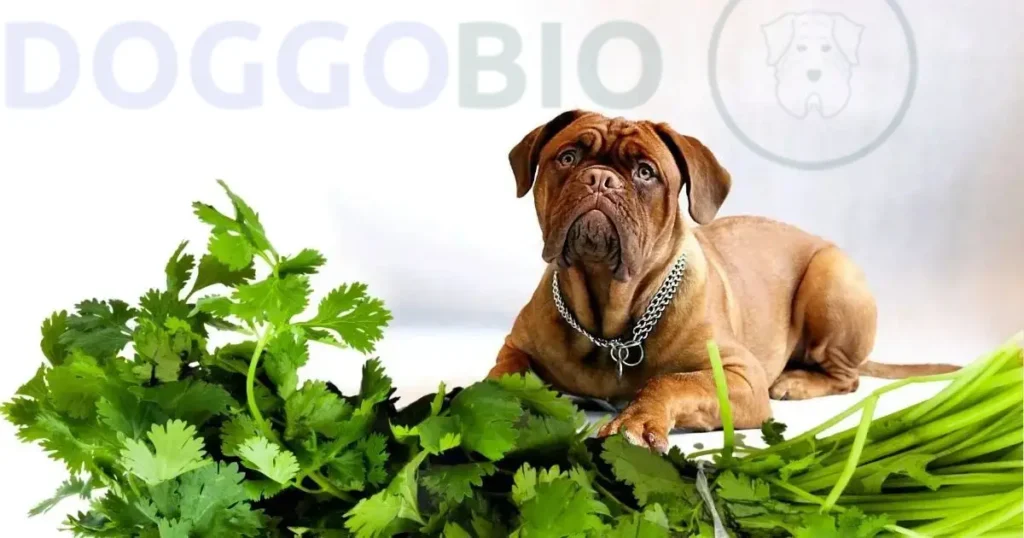As pet owners, we often ponder what human foods are safe to share with our furry friends. One such common question that frequently comes up in these discussions is, “Can dogs eat cilantro?” The short answer is yes. Dogs can eat cilantro. This aromatic herb is generally considered safe for dogs in moderate amounts. However, as with any food that is not a regular part of a dog’s diet, there are essential considerations to remember.
In this article, we will delve into the benefits and potential concerns of feeding cilantro to dogs, helping you make an informed decision about including this herb in your dog’s diet.
Can Dogs Eat Cilantro?

The short answer is yes, dogs can eat cilantro. This herb is generally safe for dogs and can be a healthy addition to their diet. However, as with any human food, it should be in moderation.
Cilantro contains several nutrients beneficial to dogs, but it’s important to introduce it slowly and watch for any adverse reactions.
The Nutritional Value of Cilantro for Dogs
Cilantro is packed with vitamins and minerals that benefit humans and dogs. It contains high levels of vitamins A, C, and K and calcium, iron, and potassium. These nutrients are essential for maintaining a healthy immune system, strong bones, and overall well-being.
Benefits of Cilantro for Dogs
- Anti-inflammatory properties: Cilantro contains anti-inflammatory compounds, which can help alleviate symptoms of arthritis and other inflammatory conditions in dogs.
- Digestive aid: Cilantro is rich in fiber, which can help improve digestion in dogs. It also contains enzymes that aid in the breakdown of food, making it easier for dogs to absorb nutrients.
- Freshens breath: Bad breath is common among dogs, but cilantro can help freshen their breath. Its antibacterial properties can combat the bacteria in their mouth that cause bad breath.
Risks of Cilantro for Dogs
- Allergic reactions: Just like humans, some dogs may be allergic to cilantro. If your dog experiences any adverse reactions after consuming cilantro, such as vomiting, diarrhea, or skin irritation, it’s best to avoid giving it to them in the future.
- Toxicity: While cilantro is generally safe for dogs, large amounts can be toxic. It contains a compound called coumarin, which can cause liver damage in high doses. Therefore, it’s important to moderate your dog’s intake of cilantro.
- Gastrointestinal upset: Some dogs may experience gastrointestinal upset after consuming cilantro, especially if they have a sensitive stomach. This can manifest as vomiting, diarrhea, or gas.
How Much Cilantro Can Dogs Eat?

As mentioned earlier, moderation is essential when it comes to feeding cilantro to your dog. A small amount of cilantro added to their food can provide some health benefits without causing any harm.
The general rule of thumb is to give your dog no more than 10% of their daily food intake in cilantro. For example, if your dog eats 1 cup of food daily, you can give them up to 1 tablespoon of cilantro.
Tips for Feeding Cilantro to Your Dog
- Always wash cilantro thoroughly before giving it to your dog to remove any dirt or pesticides.
- Chop or blend the cilantro into small pieces to make it easier for your dog to digest.
- Introduce cilantro gradually into your dog’s diet to see how they react.
- Avoid giving your dog cilantro cooked with other ingredients, such as spices or oils, as these can harm them.
Can Dogs Eat Cilantro Leaves and Stems?
Yes, cilantro leaves and stems are safe for dogs to eat. However, the branches may be more complex to digest, so chopping them into smaller pieces is best. The leaves contain more nutrients than the stems, so feeding your dog the leaves is better.
What’s The Difference Between Cilantro And Coriander?
Cilantro and coriander are often used interchangeably but are different parts of the same plant. Cilantro refers to the leaves of the coriander plant, while coriander refers to the seeds. Both are safe for dogs to consume, but cilantro contains more nutrients and is easier to digest.
When Can We Discontinue the Use of Cilantro?

If your dog shows any signs of discomfort, allergies, or gastrointestinal issues after consuming cilantro, it’s advisable to discontinue its use immediately.
Consult with a veterinarian if any concerning symptoms arise. It’s also essential to stop or reduce the amount of cilantro if your dog doesn’t seem to enjoy it.
Some Posts You Wanna Read More
- Can Dogs Eat Potato Salad?
- Can Dogs Eat Cabbage?
- Can Dogs Eat Coleslaw?
- Can Dogs Eat Egg Salad?
- Can Dogs Eat Horseradish?
- Can Dogs Eat Jicama?
- Can Dogs Eat Lima Beans?
- Can Dogs Eat Mushrooms?
- Can Dogs Eat Okra?
Frequently Asked Questions
Can puppies eat cilantro?
Yes, puppies can eat cilantro in moderation. However, it’s best to consult your veterinarian before introducing new food into their diet.
Is cilantro safe for pregnant or lactating dogs?
Yes, it’s generally safe for pregnant or lactating dogs to consume cilantro, but monitoring their intake and consulting with your veterinarian if you have any concerns is essential.
Can dogs with medical conditions eat cilantro?
If your dog has a medical condition, it’s best to consult your veterinarian before giving them cilantro. Some conditions may be aggravated by cilantro, such as liver disease or allergies.
Can dogs eat cilantro pesto?
No, it’s not recommended to give your dog cilantro pesto. Pesto usually contains other ingredients, such as garlic and nuts, which can harm dogs.
Can cilantro help with my dog’s bad breath?
Yes, cilantro can help freshen your dog’s breath. You can add a small amount of chopped cilantro to their food or mix it with some water and use it as a mouthwash for your dog.
Conclusion
In conclusion, “Can Dogs Eat Cilantro?” can be answered with a reassuring yes. Cilantro can be a safe and occasionally beneficial addition to your dog’s diet in moderation.
It’s important to remember that every dog is unique, and what works for one may not work for another. Gradually introduce any new food, including cilantro, and watch for any signs of adverse reactions. Consulting with your veterinarian is always a wise step when changing your dog’s diet.
While cilantro can offer some health benefits, it should never replace the core components of your dog’s nutrition. Used wisely and sparingly, cilantro can be a fun, flavorful treat for your canine companion, adding a little variety to their diet safely and healthily.

Pingback: Can Dogs Eat Potato Salad? Navigating Safe Snacking! 2024